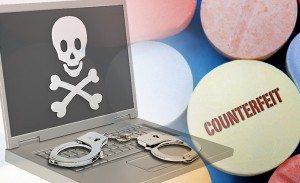 When it comes to counterfeit drugs, few countries have the regulatory and policing power of the United States. Lack of regulation and enforcement are among the reasons why the World Health Organization (WHO) estimates that between 1% and 10% of drugs sold around the world, and up to as many as 50% in some countries, are counterfeits.
When it comes to counterfeit drugs, few countries have the regulatory and policing power of the United States. Lack of regulation and enforcement are among the reasons why the World Health Organization (WHO) estimates that between 1% and 10% of drugs sold around the world, and up to as many as 50% in some countries, are counterfeits.
In the U.S., there are strict laws against counterfeiting drugs, and the responsibility for enforcement is scattered across many agencies, including the Federal Bureau of Investigation (FBI), the Food and Drug Administration (FDA), the Drug Enforcement Administration (DEA), Immigration and Customs Enforcement (ICE), and state and local police. What happens to counterfeit drug manufacturers and sellers in other countries?
Below are some examples:
- According to Health economist and author, Roger Bate, China and India are at the forefront of selling fake drugs locally and globally. In an effort to combat the problem in China, Chinese law enforcement is taking counterfeiting very seriously, sentencing counterfeit drug makers and sellers to between 3-10 year s and imposing a fine for drugs that do damage to someone’s health. China sentences up to 10 years in prison, or even harsher penalties, for dealing in drugs that cause the death of someone.
- In India, the penalty for counterfeit drug manufacturing is imprisonment for no less than 3 years and a fine of 5000 rupees ($83 U.S. equivalent). However, the Postgraduate Medical Journal (PMJ) indicated that “the size of the fine is very small compared to the profits to be made in this trade.” Even with the apparent need, India’s Central Drugs Standard Control Organization – the country’s drug regulator – has a staff of 323, about 2% of the size of the FDA, and expansion is not in the plans.
- Each year in Dubai, an estimated $50 billion worth of counterfeit goods, including drugs, are manufactured and sold. According to The National, a new law enacted in March 2014 establishes a maximum penalty of imprisonment of up to two years and/or a fine of as much as Dh1 million ($272 U.S. equivalent) for counterfeit drug manufacturers and sellers.
At CSIP, we believe that in order to combat counterfeit drugs, officials in various countries must demonstrate that the proper authorities are enforcing existing laws and working to improve them. In addition, we support the efforts of international regulatory groups in developing standards to combat counterfeit medications.
#####
The Center for Safe Internet Pharmacies (CSIP) and our 13 member companies have the shared goal of helping address the growing problem of consumer access to illegitimate pharmaceutical products on the Internet. Continue to read this blog for updates on CSIP’s education, enforcement and information-sharing efforts.

